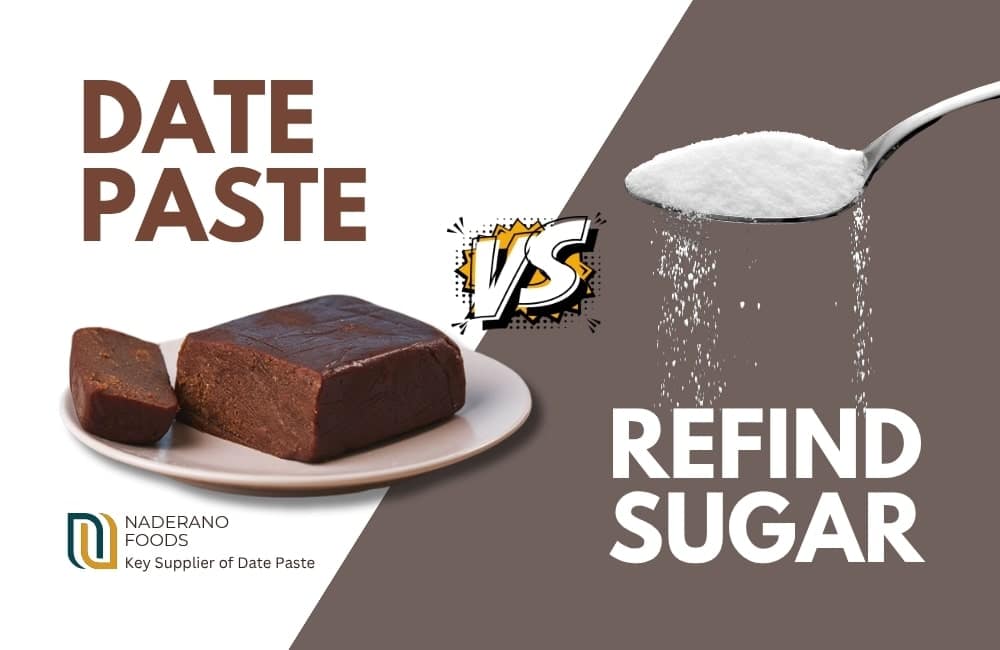In today’s health-conscious food industry, product developers are weighing date paste vs. refined sugar as the sweetener in new recipes. With consumers increasingly seeking natural and better-for-you products, manufacturers are looking beyond traditional white sugar and exploring fruit-based alternatives like date paste.
Naderano Foods – a B2B Date Paste Manufacturer and exporter – has seen rising demand from food manufacturers aiming to create healthier products. This article compares date paste and refined sugar in terms of nutrition, glycemic impact, and processing, and discusses why date paste is emerging as a smarter choice for forward-thinking food brands.
Date Paste vs. Refined Sugar: Key Differences
Refined sugar is a highly processed sweetener (from sugarcane or beets) that is essentially pure sucrose – empty calories with no fiber, vitamins, or minerals. Date paste, by contrast, is made by simply grinding whole dates into a smooth puree. This minimal processing retains the whole-food goodness of dates: natural fruit sugars along with fiber and micronutrients. Date paste has a rich brown color and caramel-like taste, and in recipes it not only sweetens but also adds moisture and a hint of fruit flavor.
In short, refined sugar is a one-dimensional sweetener, whereas date paste is a nutrient-rich, natural ingredient that provides sweetness plus additional benefits.
Nutritional Comparison: Date Paste vs. Refined Sugar
In terms of nutrition, date paste far outshines refined sugar. White sugar contains no fiber or nutrients – it’s 100% carbohydrates with nothing beneficial accompanying the calories. By contrast, date paste brings valuable components from the fruit:
- Fiber: Date paste retains dietary fiber that aids digestion and slows sugar absorption, leading to a more gradual energy release.
- Vitamins & Minerals: Dates provide important minerals like potassium, magnesium, and iron, as well as vitamins. Using date paste can add a small but meaningful boost of these nutrients to a product – something refined sugar cannot offer.
Overall, replacing refined sugar with date paste turns an empty-calorie ingredient into one that contributes fiber and micronutrients. On ingredient labels, seeing “date paste” instead of “sugar” signals to health-conscious consumers that a product is made with more wholesome, natural ingredients.
Glycemic Impact and Health Benefits
Another major difference is how these sweeteners affect blood sugar. Refined sugar ranks high on the glycemic index – it’s digested quickly, causing rapid blood glucose spikes followed by crashes. This rollercoaster effect often leads to energy dips.
Date paste has a gentler glycemic impact. The fiber and complex carbs in dates slow down sugar absorption, so foods sweetened with date paste cause a steadier rise in blood glucose. This makes date paste a better choice for products where stable energy release is desired (for example, breakfast bars that promise no sugar crash). It’s also gentler on the body, an advantage for those watching their sugar intake. While date paste still contains natural sugars and should be used in moderation, it offers sweetness with far fewer highs and lows than refined sugar.
Advantages of Using Date Paste in Manufacturing
For food manufacturers, date paste offers several compelling benefits beyond its nutritional profile:
- Clean Label Appeal: Date paste aligns with the clean label trend. As a single, recognizable ingredient (“dates”), it enables attractive claims like “no refined sugar” or “sweetened with fruit” that resonate with consumers.
- Added Nutrition: Incorporating date paste adds fiber and minerals to recipes. Even in small amounts, it contributes nutrients like potassium – a clear advantage over empty-calorie sugar.
- Enhanced Flavor & Texture: Date paste’s rich, caramel-like taste can improve a product’s flavor profile, whereas refined sugar only provides sweetness. It also brings moisture and binding power. Baked goods and bars made with date paste tend to be soft and chewy, as the paste keeps them moist and holds ingredients together.
By leveraging these advantages, manufacturers can create sweet products that are not only healthier but also more enjoyable for consumers – a win-win for both business and customer.
Versatile Applications of Date Paste
Date paste is a versatile sweetener that fits into many food categories. Popular use cases include:
- Bakery Products: In breads, muffins, cookies, and cakes, date paste can replace refined sugar completely or in part. It sweetens naturally, adds a hint of caramel flavor, and helps baked goods stay moist and soft.
- Bars and Cereals: Many granola bars, protein bars, and even breakfast cereal clusters use date paste as both a sweetener and a binder. It holds together oats, nuts, and fruit without the need for corn syrup or refined sugars. Brands often highlight that their bars are sweetened only with dates – a strong selling point for health-conscious buyers.
- Baby Foods & Snacks: In infant purees, toddler biscuits, and fruit snacks, date paste provides gentle sweetness from an all-natural source. Parents prefer to avoid refined sugar for young children, so using fruit-based sweeteners like date paste helps products meet “no added sugar” criteria while still tasting appealing to little ones.
2023–2025 Trend: Shifting Away from Refined Sugar
The rise of date paste aligns with a broader industry shift: manufacturers are actively reducing refined sugar due to consumer demand and policy pressures. Since 2023, this trend has accelerated for several reasons:
- Health & Regulations: Consumers are more aware of the health risks of excessive sugar (obesity, diabetes, etc.) and are cutting back. At the same time, governments have introduced measures like sugar taxes and stricter labeling laws, pressuring companies to lower sugar content in products.
- Preference for Natural Sweeteners: Shoppers today favor simple, natural ingredients. They want sweet flavor from sources like fruit rather than from refined sugar or artificial sweeteners. Date paste fits this demand perfectly. The market for natural sweeteners is growing steadily – many new products in 2024–2025 proudly advertise that they are sweetened with dates or other fruit-based sugars.
Conclusion
Date paste has emerged as a healthier, natural alternative to refined sugar – one that aligns with modern consumer trends without sacrificing taste or quality. By offering sweetness along with fiber, nutrients, and a lower glycemic impact, date paste empowers food manufacturers to create the next generation of better-for-you products.
At Naderano Foods, we specialize as a date paste supplier to food manufacturers worldwide. If your company is looking to reformulate existing products or develop new recipes with a cleaner, fruit-based sweetener, we’re here to help. Contact Naderano Foods today to learn how our date paste can elevate your product line.
LEAVE US A MESSAGE ON WHATSAPP


